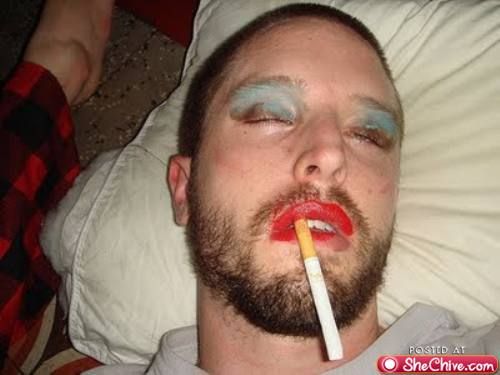ProudLib72
ProudLib72's JournalWhat's the worst thing you've ever had in your mouth?
It doesn't have to be food, but it could be.
Mine would be gear oil. The smell alone is enough to make you gag.
Foodwise, I would have to say an oyster. Come to think of it, I would rather have gear oil than an oyster! ![]()
"1984" at Seventy: Why We Still Read Orwell's Book of Prophecy
Partly it’s owing to the fact that, unlike “Darkness at Noon,” Orwell’s book was not intended as a book about life under Communism. It was intended as a warning about tendencies within liberal democracies, and that is how it has been read. The postwar Sovietization of Eastern Europe produced societies right out of Orwell’s pages, but American readers responded to “1984” as a book about loyalty oaths and McCarthyism. In the nineteen-seventies, it was used to comment on Nixon and Watergate. There was a bounce in readership in 1983-84—four million copies were sold that year—because, well, it was 1984. And in 2016 it got a bump from Trump.
https://www.newyorker.com/news/daily-comment/1984-at-seventy-why-we-still-read-orwells-book-of-prophecy?utm_source=pocket-newtab
Tutored a Man from Chad Today
I work as a writing tutor at the community college. Most of my tutees are foreigners, so I get to read a lot of interesting stories...
This man brought me an essay he had written for his Philosophy class. He wanted help with grammar (the usual complaint.) We finished going over that paper, and he brought out a second one for me to look at. I'm not supposed to check more than one paper per session, but he was the only other person I had today. I just went ahead...
His second paper was a cover letter for a scholarship application. The prompt he was responding to was "What was the biggest obstacle you faced in your education and how did you overcome it?" You've probably seen a similar, mundane prompt at some point in your life. It's the kind of prompt that makes you wonder if the people awarding the scholarships have any creativity at all.
Well, the man began his essay by pointing out that he had grown up during a time of civil war in his country. His biggest obstacle was acquiring access to any kind of education at all. He went on to mention that he and his uncle were arrested by the government and beaten; his uncle later died from the wounds he had received. The rest of his story was about coming to America and working his way through school to finally be where he was now: in college.
His was not the first horror story I've read from the students who attend the college. For the decade I have taught and tutored there, I have heard dozens of such stories from across the globe. All these stories I read and hear from students have had an impact on me. How could they not?! I could give you some sort of message that I take away from a story like this, but I feel like telling you the message would render it much less powerful and I would sound like one of those people creating prosaic prompts for scholarship applications.
Which One of You Stole My Mojo?
Give it back right now! I need it for a hot date tomorrow. ![]()
Listened to 2 Minutes of Xtian Talk Radio
They got my attention by mentioning how scientists had discovered a galaxy 50 billion light years away. I thought it would be about science, so I listened. Then came the part about how science relies on "exaggeration and conjecture". I was dumbfounded for a few seconds, and then I turned the station.
What gets me is that all the progress made in the last 1,000 years gets thrown out the window when it comes to religion, and this is what RW radio has been spewing for decades? No wonder listeners are so incredibly thick!
![]()
The next big thing in fashion? Not washing your clothes
This new flock of wash-less brands are capitalizing on the convenience of not having to launder your clothes a lot, which is particularly useful if you’re traveling or crunched for time. But they’re also making an environmental argument: Over-washing clothes is not good for the planet. Washing machines account for 17% of our home water usage, and a quarter of a garment’s carbon footprint over the course of its lifetime comes from cleaning it. And yet, washing machine company AEG estimates that 90% of clothes washed aren’t actually dirty enough to be thrown in the laundry basket.
Part of this has to do with the fact that laundry detergent brands have convinced consumers that they need to wash their clothes frequently, perhaps even after every wear, to be clean and hygienic. For instance, many laundry detergent ads show parents washing their children’s muddy and messy clothes, suggesting that good parenting involves doing a lot of laundry. Mac Bishop, who founded Wool & Prince, saw this firsthand. His first job after college was working for the marketing department of Unilever, which produces dozens of laundry detergent brands around the world. “The only way to grow as a laundry detergent brand is to make customers feel like they need to keep washing their clothes more and more,” he says.
https://www.fastcompany.com/90359188/the-next-big-thing-in-fashion-not-washing-your-clothes?utm_source=pocket-newtab
Sounds good to me! I don't like washing clothes at all. If I can go two weeks wearing the same pair of underwear... Heaven!
Do You Know Who Cassandra Fairbanks Is?
Just in case you've never heard of her, here are a couple of articles. It's like someone just flipped a switch and she went from very liberal to vilest magat overnight. Very interesting conjecture as to why.
She was a strong supporter of socialist Bernie Sanders who was Hillary Clinton’s rival within the Democratic Party at the time and stopped at nothing in promoting him while on the other hand, she posted derogatory tweets about Donald Trump.
Cassandra made headlines in 2016 when she shifted political allegiance from left to right. Her support with the Democrats began to chip away as Hillary Clinton progressed towards being nominated as candidate and the final straw that saw her shifting political stance was the mass shooting in June at a nightclub in Orlando which made her begin to take a cursory look at Trump and people who had been advocating censorship on the left.
In June 2016; she made public her support for Trump by posting a video in which she stated her views. There were opinions that her political transformation was fuelled by her employer, Sputnik. https://heightline.com/cassandra-fairbanks-bio-husband/
It's Not Fair! Women Put On Makeup And Look Beautiful. I Put On Makeup And Look Like...

Soooooo not fair!
It Turns Out Queen Elizabeth Was Wearing a GoPro
You won't believe what it recorded... or maybe you will.
This is what you get when you dress a pig in a tux...

Profile Information
Member since: Sun Jan 1, 2017, 06:42 PMNumber of posts: 17,984
